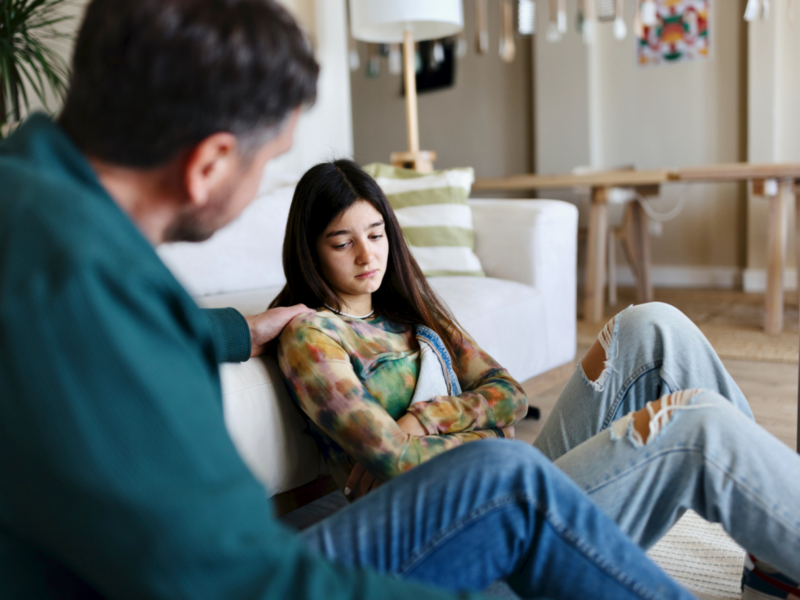
Table of Contents
Let’s Talk About Family Trauma
Written By: Charlie Health Editorial Team

Clinically Reviewed By: Dr. Don Gasparini
January 23, 2024
6 min.
It’s a kind of trauma that can impact peoples’ family dynamics, relationships, and mental health.
Learn more about our Clinical Review Process
Table of Contents
When members of a family unit endure a traumatic event — including abuse, neglect, loss, or other harmful circumstances — it can result in family trauma, marked by emotional or physical distress in response to the event or circumstance.
Like all types of trauma, family trauma can have a lasting effect on people, particularly affecting their family relationships. It can also cause behavioral and mental health issues, relationship difficulties, and even physical health problems. Even if they endure the same traumatic event, members of a family unit won’t necessarily respond the same way to family trauma.
Below, we delve into common causes of family trauma, how traumatic childhood experiences take a toll on relationships, and how to heal from family trauma.

Healing for the whole family
Charlie Health’s program incorporates individual and family therapy for long-term healing.
What is family trauma
As mentioned, family trauma refers to distressing experiences or events that affect one or more members within a specific family unit. It causes lasting emotional consequences and relationship issues for those directly affected in the family.
Another concept that often comes up when talking about family trauma is intergenerational trauma (also known as ancestral trauma), which is trauma transmitted across generations. It often stems from historical events, systemic issues, or cultural oppression, affecting families over time. While all intergenerational trauma involves families, not all family trauma is necessarily intergenerational.
What are the common causes of family trauma?
A range of events and experiences can cause family trauma. Also, people react differently to experiences, so what’s traumatic for one family may not be for another. Some common causes of family trauma, though, include:
- Physical, emotional, or sexual abuse, including domestic violence
- Emotional or physical neglect
- Divorce or separation
- Loss or death of a family member
- Mental health issues experienced by a family member
- Financial struggles
- Cultural or religious conflicts
What are the symptoms of family trauma in children?
Children experiencing family trauma often display a range of emotional, behavioral, and physical symptoms. People have different trauma responses, though, so not all children will display the same family trauma symptoms. That said, some common symptoms of family trauma in children are as follows.
Emotional distress
Heightened anxiety or fear, persistent sadness, and mood swings are all examples of emotional distress in children resulting from childhood trauma. Some children may feel angry and irritable, having outbursts directed at peers, siblings, or adults, whereas others may develop emotional numbness and become detached. This range of emotions demonstrates the many ways family trauma can impact a child’s emotional well-being.

Regressive behaviors
Children enduring family trauma may show signs of regression, meaning characteristic of a younger age. This can include baby talk, clinginess, bedwetting, thumb-sucking, and nightmares.
Physical symptoms
Trauma, including family trauma, often manifests in physical symptoms, data shows. This can include headaches, stomachaches, changes in appetite leading to weight loss or gain, and fatigue or low energy levels.
Academic challenges
Academically, children affected by family trauma may experience a decline in school performance. Difficulty concentrating and increased school absences may further highlight the challenges they are facing in coping with the family-related stressors.
Social withdrawal
Children enduring family trauma may isolate themselves from peers, face difficulties in forming or maintaining relationships, and show a reluctance to participate in various activities. These social behaviors can be a reflection of the emotional toll that family trauma takes on a child’s social interactions.
How can family trauma affect relationships?
Research consistently shows that trauma, including family trauma, can affect people’s relationships. Children learn about the world, including their relationship approach, by observing and imitating caregivers, data shows. This means that, if left unaddressed, the effects of family trauma can impact a child’s ability to build healthy relationships in and outside their family unit.
According to one article, psychological trauma — including but not limited to relational trauma, betrayal trauma, attachment trauma, and developmental trauma — can specifically take a toll on family relationships. Similarly, a study of adults found that emotional abuse, emotional neglect, and sexual abuse during childhood are linked to specific problems in adult relationships.
There’s long been a link between attachment style and childhood trauma. Experiencing trauma in early childhood can greatly disrupt the ability to form secure attachments, data shows, making people more prone to develop a dismissive attachment style or anxious attachment style.
However, family trauma doesn’t have to define your relationships. Research shows that people can change their attachment styles when they set goals to do so, demonstrating how anyone can move toward more secure attachments and healthy relationships.
What should families do after a traumatic experience?
After a traumatic experience, families may benefit from taking several supportive steps to cope and heal. The specific steps depend on the nature and severity of the trauma, and how individuals and families navigate and recover can be influenced by support systems, coping mechanisms, and resilience. Here are some general suggestions.
Build a support network
After a traumatic experience, building a strong support network helps in sharing the emotional burden. It also offers diverse perspectives and resources that contribute to the family’s overall resilience and recovery. Family members can consider reaching out to friends, relatives, or community support groups.
Respect individual coping styles
Recognize that individuals within the family may cope with trauma differently. Respect and support diverse coping styles, understanding that everyone has their own pace of healing.
Establish routines
Establishing a sense of routine and normalcy can be stabilizing for family members. Consistent routines can provide a sense of security during challenging times.
Practice self-care
Emphasize the importance of self-care for each family member. This includes taking time for relaxation, engaging in activities they enjoy, and prioritizing their physical and mental well-being.
Seek professional support
Encourage family members to seek professional help, such as therapy or counseling, to address the emotional impact of the trauma. A mental health professional can provide guidance and coping strategies.
Therapy for family trauma
Therapy for family trauma often incorporates different approaches and modalities to address and heal emotional wounds within the family. It is typically collaborative, involving active participation from all family members to create a safe environment for processing experiences, enhancing coping skills, and rebuilding healthier connections. Treatment may consist of family, individual, and couples therapy to ensure all family members feel supported.

Therapeutic modalities are chosen based on the family’s specific needs and dynamics. For instance, families with young children may incorporate play therapy, whereas others utilize trauma-focused approaches like trauma-focused cognitive-behavioral therapy and eye movement desensitization and reprocessing (EMDR). Ultimately, it’s up to a family and mental health professional to determine the best approach for family trauma therapy.
How Charlie Health can help with family trauma
If your family is struggling with family trauma, Charlie Health is here to help. Charlie Health’s virtual Intensive Outpatient Program (IOP) provides more than once-weekly mental health treatment for young people and families dealing with complex mental health conditions, including trauma. Our expert clinicians incorporate evidence-based therapies into individual counseling, family therapy, and group sessions. With this kind of holistic treatment, managing family trauma is possible. Fill out the form below or give us a call to start healing today.
References




